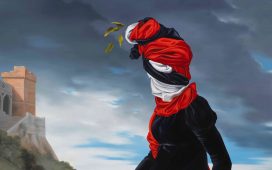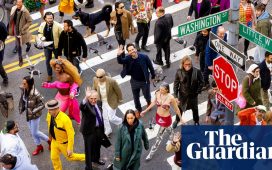Yulia Tsvetkova faces six years in prison
© Amnesty International
Police detained over 40 protestors on Saturday who came out in Moscow and St Petersburg to defend Yulia Tsvetkova, a LGBTQ activist who faces six years in prison on pornography charges for posting feminist body-positive art that includes vaginas.
SotsFemAlt, a leftist feminist organisation that was coordinating pickets, reported on social media that the protests were held in 20 cities across Russia and around the world. Most of the detained were released by late Saturday evening.
The rally in Moscow was held near a monument to Nadezhda Krupskaya, Vladimir Lenin’s wife, and ended with police using force to detain protesters, who had stood in one-person pickets, which are allowed by law. They were holding signs such as, “My body is not pornography.”
The trial of Tsvetkova, who was released from house arrest in March, is scheduled for July. Her troubles began last year when she was accused of promoting LGBTQ themes at a youth arts festival that she ran. She had posted the drawings to a social media group she created called “Vagina Monologues”.
Russia’s arts community is now rallying behind the 27-year-old activist. An online poetry and arts marathon was also held on 27 June, organised by Moscow’s Voznesensky Center, which is named after the poet Andrei Voznesensky, a leading voice of the cultural thaw under Soviet leader Nikita Khrushchev following the death of dictator Joseph Stalin.
The artist Aidan Salakhova, who addresses gender issues in her art, participated in the marathon. She told RBC, a Russian publication, that Tsvetkova’s case shows that Russia and the world are now less free than in the 1990s or even under Soviet leader Leonid Brezhnev, a period known for hypocritical morality. If the prosecution is carried out “and if there is a precedent that a stylised drawn vagina can be called pornography, then it will be possible to imprison half the artists in our country.”
In a Facebook post on Monday, Tsvetkova wrote that she can no longer walk calmly past the police station in Komsomolsk-on-Amur where she was charged.
“I think about how many fates have been broken in the confines of our police state,” she wrote. “How many people were tortured, forced to incriminate themselves and loved ones, how many were pressured, how many destinies were broken.”
Such buildings are full of “broken hearts and broken lives” happening “right in the centre of the city, in broad daylight, in front of everyone,” she wrote. “Evil is easy to overlook, but having noticed it, it is very difficult to un-see.”









